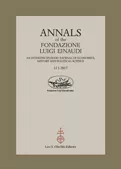The Capital Order presents some absolutely correct contentions against the stream. The author, Clara E. Mattei, presents a “backwards history” (storia a ritroso is an expression by Piero Sraffa), where the past is questioned from the present. The Great War is considered the crucial turning point in capitalism’s timeline. Economists are rightly subjected to merciless criticism as custodians of esoteric and neutral expertise. Economic policy is scolded as the politically biased management of the capital order, with Keynesianism as a variant. Mattei’s is an original archival research containing the first English translation of important material from Italian. The book is splendidly written, in a crystal-clear style, but we think it is important to integrate some ignored and yet important elements which are not dealt with by Mattei. A problem in the book is that the fertile anachronism of the questions too often turns into the anachronism of the answers. The review is organised as follows. First, we give a summary of The Capital Order. Second, we problematise some conclusions of the volume. Third, we concentrate on Mattei’s key comparison between Britain and Italy just after WWI, to draw different inferences. In conclusion, we pull together the main themes, looking at the more recent decades and the book’s theoretical foundation. What follows is to be intended as a critique and not as a criticism: recognising the inner truth of what is discussed, even if we cannot agree with the whole of it, and trying to reframe it in a larger vision. Sometimes, when needed, we turn the argument upside down so that what is actual and vital in it may stand out in its usefulness and richness for the theoretical and political debate. That is why ours is a sympathetic critique.



